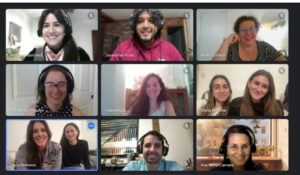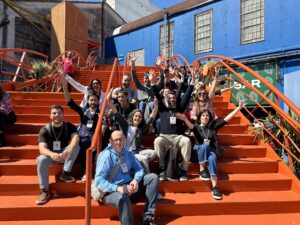Argentine journalist Laura Zommer saw the future.
When she started as executive director of the fact-checking platform Chequeado in 2012, the concept of misinformation or fake news wasn't as widespread as it is today. At the time, she was betting on “a niche form of journalism.”
The team from Chequeado, a global reference for fact-checking and the first site in Latin America exclusively dedicated to the practice, started out verifying public statements.
“We would fact-check when an official, someone with a name, title, and position, said something that didn’t align with the facts,” Zommer told LatAm Journalism Review (LJR). “But later, we noticed there were days when everyone was talking about a particular subject, and we couldn’t identify where it came from.”
After 12 years leading a team that was a pioneer in digital journalism in Latin America, Zommer made the leap to North America, co-founding Factchequeado, an organization fighting misinformation affecting Latino and Hispanic communities in the United States.
She now leads this newsroom ahead of the Nov. 5 U.S. presidential election, which has seen growing misinformation.
In July, Zommer received a special citation from the Maria Moors Cabot Prize, the oldest international journalism awards given by Columbia University in New York. The jury called her a “visionary and a beacon of integrity and innovation in modern journalism in the Americas.”
The gold medalists were Lalo de Almeida from Brazil; Carlos Ernesto Martínez from Salvadoran investigative site El Faro; John Otis from NPR and the Committee to Protect Journalists in the U.S.; and Frances Robles from The New York Times. The think tank and investigative journalism organization InSight Crime also received a special citation.
LJR spoke with Zommer about what the recognition means to her, her biggest challenges in Latin America, her vision for the future and how she maintains public trust in fact-checking processes.
The interview has been edited for brevity and clarity.

Factchequeado team from the US, Spain and Argentina covering the Harris-Trump debate (Screenshot).
1. You’re now leading Factchequeado, which serves Latino communities in the U.S. Why is it important to fight misinformation in Spanish in the U.S.?
There are over 65 million Hispanics in the United States, according to the latest census update. Of them, more than 42 million say they speak Spanish at home.
Many of them want to get information in Spanish, but there isn’t enough content available. We need to ensure that we’re on the channels and in the formats people are choosing to get informed.
So, if you ask why it’s important to fight misinformation, the answer is simple: because there’s misinformation.
We address a population that hasn’t been sufficiently researched; there’s almost no research on how misinformation circulates in Spanish, the main topics, the key actors, etc. We aim to serve those who want to be informed in Spanish in the U.S. and that way counter misinformation.
Besides, misinformation has no borders. What starts in the U.S. eventually reaches Latin America or Spain and vice versa. So, developing strategies to understand how misinformation circulates in Spanish in the U.S. can also make us more effective in fighting it in other countries.
2. In an increasingly polarized media environment, how do you maintain impartiality and public trust in fact-checking processes?
This question has kept me up at night since I started Chequeado in 2012 because it’s not enough to be independent – you also need to appear to be independent. That means being credible to those who might benefit from what we do. It’s not enough for me to be sure I’m doing things right. The people reading or watching need to believe it, too.
We follow a strategy identified by the International Fact-Checking Network, which involves a code of principles that requires us to have a transparent methodology and to treat everyone equally—Democrats and Republicans in the U.S., public and private sector actors, media outlets with different editorial leanings, etc.
Obviously, we handle polarization as best we can. We all prefer to live in democratic, less polarized environments because greater polarization leads to less democratic deliberation. In other words, the more polarized, the easier it is for misinformation to spread.
Our tool is to do our work professionally and transparently, which means making everything clear—methodology, funding, conflicts of interest, etc.

Chequeado team at the Media Party 2023 in Buenos Aires. (Photo: Courtesy)
3. You led Chequeado, one of the first fact-checking initiatives in the Global South, for 12 years. What was your biggest challenge?
I had a challenging case involving a famous TV host in Argentina who had taken chlorine dioxide during the pandemic. She never forgave us for fact-checking her. Later, she aired photos of my wedding on TV for three days, claiming my husband and I owned a multi-million-dollar mansion in Miami. The house actually belonged to someone else with the same last name as my husband, but no relation, which could have been easily verified.
That was a problem, but you can step back from the scene and protect yourself to some extent. My biggest challenge, however, was realizing that as a leader, I wasn’t as protective of my team as I could have been.
After a collaborative project campaign in 2019, we were all on the verge of burnout, including me. It’s something I need to correct, and I don’t want it to happen at Factchequeado. You have to take care of your team.
I’m 50 now, and our generation of journalists was much less aware of the importance of mental health and team care. Fortunately, we’re more conscious of it now.
4. How do you envision the future of fact-checking in an era of artificial intelligence (AI) and deepfakes? What tools or strategies will journalists need to adapt to these challenges?
We’ve been discussing this for two years, ever since AI started gaining attention. People talk about the revolution it could bring, and I’m not saying it won’t. But we haven’t seen it yet.
There have been some cases, though. In the U.S., we’ve seen the use of Univision presenter Jorge Ramos’s voice and image to promote fake government aid programs from Joe Biden; images of Trump embracing Black communities; or Kamala Harris with communist symbols or alongside rapper P. Diddy, who’s been arrested on charges of trafficking and sexual abuse.
It’s not that we haven’t seen it, but I’d say AI has reinforced misinformation rather than revolutionized it. Right now, disinformers don’t need AI. They get by with Photoshop or an old photo circulating in WhatsApp group chats.
What I hope for fact-checking is that we start adopting AI strategies that make us quicker to react, produce quality content more affordably and distribute it at a lower cost.
We also need to collaborate with both humans and technology, giving technology the tasks it does better than us—many mechanical and high-volume tasks—while we focus on areas where we are still irreplaceable.
We’re irreplaceable when it comes to misinformation in Spanish because of our cultural understanding and context comprehension.
Part of why misinformation circulates is that it’s both a global and hyper-local problem. Misinformation takes hold when an element makes it relevant to a particular community. Understanding that is something humans still do better than technology.
5. How do you feel about this recognition at the 2024 Maria Moors Cabot Prizes, and how is it different from others you’ve received?
This recognition is incredibly valuable to me because it comes in the U.S., where I’m currently pursuing my professional career, and from Columbia’s journalism school. It’s a prestigious award in the journalism world, and the jury’s words about me were very moving.
When I started Chequeado, I was ahead of the curve, betting on what was, at the time, a niche form of journalism that investigative journalists didn’t take seriously. But I knew it was serious, and that the problem was serious, and that we needed better strategies to tackle it. It’s always nice to be told you were ahead of the game in some way.